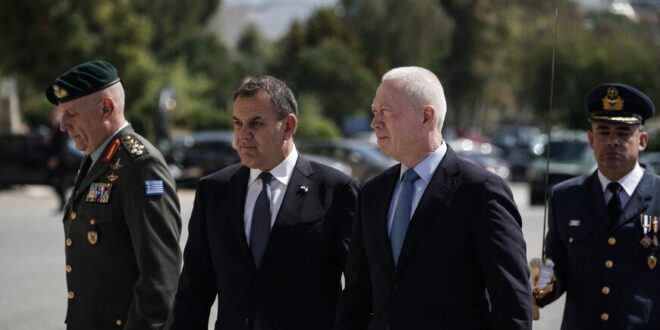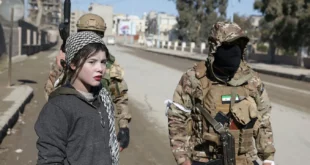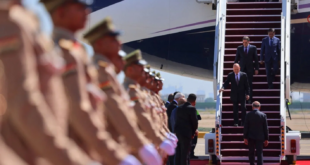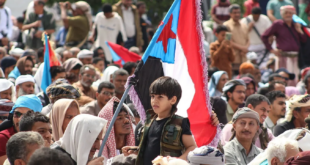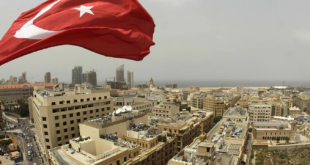Israeli Defense Minister Yoav Gallant noted that his visit to Baku brings cooperation between the two countries to a new and unprecedented level.
Israel’s Defense Minister Yoav Gallant said on Thursday that his two-day visit to Azerbaijan brings cooperation between the two countries to a new level in security, intelligence and trade.
This statement by Gallant comes as tensions between Israel and Iran-affiliated Hezbollah increase on the Israel-Lebanon border.
Briefing Israeli journalists, Gallant said that “the visit to Azerbaijan is a significant step up in the discussion on the various elements that will strengthen the relationship between the countries.” On his visit, he met Azerbaijan President Ilham Aliyev, Minister of Defense Zakir Hasanov and State Border Commander Elchin Guliyev.
“We discussed important cooperations in the security, intelligence and industrial fields. The visit will strengthen strategic relations and deepen cooperation in many ways.”
In his meetings in Baku, Gallant and Hasanov agreed to step up bilateral relations, including an agreement on establishing joint teams to advance various issues. “The intensification of our relations comes at a special and tense time throughout the region, and therefore the visit is of very great importance,” Gallant told his counterpart.
Iran high on agenda
While the goal of the visit was described as a boosting of strategic relations, the tightening of diplomatic cooperation, and the expansion of security and technological ties, the Iranian issue was high on the agenda in light of Azerbaijan’s border with Iran and both states’ mutual interest in developments in the Islamic Republic.
Azerbaijan’s foreign policy was characterized until two years ago by careful maneuvering among Turkey, the United States and Iran — the three players it deemed most relevant to its interests. However, tensions with Iran escalated in 2020 due to its support of Armenia in the conflict over Nagorno-Karabakh — support that even included exercises simulating an invasion of Azerbaijan.
Azerbaijan is also a particularly sore point with Iran given Tehran’s failure to mobilize the neighboring Shiite state as a proxy for its attempts to export the Islamic Revolution beyond its borders. In fact, Azerbaijan’s stand suggests that a Shiite state can be moderate and secular and even strive for close relations with the West and Israel. In marked contrast, Azerbaijan now considers Israel one of its closest allies, along with Turkey.
Israel and Azerbaijan have maintained full diplomatic relations since 1992, which have been bolstered considerably in recent months, culminating in the opening of the Azeri Embassy in Tel Aviv this past March. The rehabilitation of ties between Israel and Turkey has certainly facilitated this recent rapprochement. Senior Israeli officials noted to Al-Monitor that media reports about the flourishing relationship are only the tip of the iceberg.
Azerbaijan is particularly important to Israel in the Iranian context — mainly because of its proximity to Iran while Israel is about 1,500 kilometers (900 miles) away. Iran has long been trying to create a border with Israel through its Hezbollah proxy in Lebanon and Shiite militias in Syria. Staunch Israeli security ties with Azerbaijan and other countries adjacent to Iran are part of Israel’s responses to these efforts.
As such, Gallant addressed at length in his briefing also the Iranian threat to Israel. “Iran tops the list of priorities of the security establishment. The multiyear budget recently established includes billions of dollars for dealing with a third circle (Iran and its neighboring countries), to prepare for any possibility of preventing Iran from obtaining a military nuclear weapon.”
Gallant warned that Iran has not abandoned the idea of establishing military capabilities in Syria but Israel has been able to undermine those capabilities. “Looking back a decade, our activity to prevent the transfer of illegal weapons and deterrence-breaking arms has been successful,” noted Gallant.
Israel and Azerbaijan have reached a series of security agreements over the years, including on security cooperation. The Israeli defense establishment has been one of the main suppliers of aircraft, artillery, tanks and other weapons to Azerbaijan over the past decade. Israeli Foreign Minister Eli Cohen confirmed in April that Israel Aerospace Industries will supply Azerbaijan with two observation satellites at a total cost of $120 million.
The close security cooperation between the defense agencies of both countries was also reflected in this week’s announcement by Azerbaijan’s security agency that it had arrested an Afghan citizen suspected of planning an attack on a foreign embassy in Baku. It identified the man as Fawzan Mosa Khan and published his photo, saying he had planned to use explosives in order to kill embassy staff, cause significant damage to property and create panic in Azerbaijan. He was said to have carried out surveillance of areas where foreign embassies are located, and he sought local recruits to help him obtain explosives and carry out the attack. Cohen on Wednesday confirmed speculation that the Israeli Embassy was the target of the plot and accused Iran of being responsible for it.
The timing of the Azeri announcement about the thwarted bombing on the eve of the Israeli defense minister’s visit was presumably deliberate given the likelihood of quite a few attempted attacks and threats against Israeli targets in Azerbaijan that were not reported in the media. Israel says more than 50 attempted attacks by Iran against Israeli, Jewish and Western targets in various places around the world have been thwarted over the past two years.
 Eurasia Press & News
Eurasia Press & News
